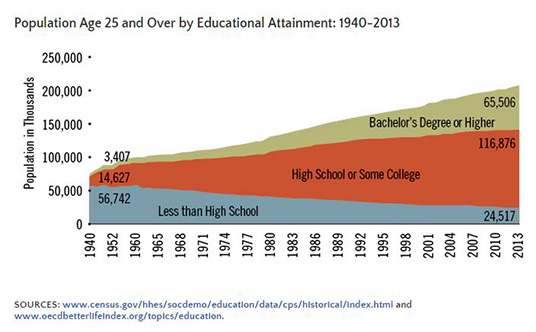How Much Education Do Americans Get?
Each issue of The Regional Economist, published by the Federal Reserve Bank of St. Louis, features the section “Ask an Economist,” in which one of the Bank’s economists answers a question. The answer below was provided by Senior Economist Guillaume Vandenbroucke.
These are important questions. Education is a primary determinant of an individual’s lifetime earnings. At a macroeconomic level, understanding the evolution of educational attainment is relevant, given the importance of human capital to the national income of countries.
On average, Americans spend about 14 years in school. Educational attainment has increased remarkably since early in the 20th century, as can be seen in the chart. In 1940, 76 percent of those 25 and older had not completed high school; by 2013, only 12 percent hadn’t.

Diego Restuccia at the University of Toronto and I have a paper in which we asked what caused this substantial trend.1 We developed a model in which individuals can accumulate human capital (i.e., become educated) and assessed how much technological progress and changes in life expectancy contributed to the increase of educational attainment. We found that skill-biased technical change represented the most important factor in accounting for the increase in educational attainment. In other words, the main reason why more people sought education was because technology keeps rewarding educated people with better and better paychecks. This may sound obvious, but there are many other reasons for people to continue their education. Knowledge could be enjoyable, for instance. After all, even retired people sometimes go back to school to learn about something they are interested in. Yet, we are finding that the strongest of all reasons is that education simply is a good investment.
Notes and References
1 Restuccia, Diego; and Vandenbroucke, Guillame. “The Evolution of Education: A Macroeconomic Analysis.” International Economic Review, Vol. 54, Issue 3, pp. 915-36.
Additional Resources
- Regional Economist: Ask an Economist
- On the Economy: Why Did Labor Force Participation by Youth Drop?
- On the Economy: What Is the Economic Impact of High School Choice?
Citation
ldquoHow Much Education Do Americans Get?,rdquo St. Louis Fed On the Economy, Feb. 23, 2015.
This blog offers commentary, analysis and data from our economists and experts. Views expressed are not necessarily those of the St. Louis Fed or Federal Reserve System.
Email Us
All other blog-related questions

